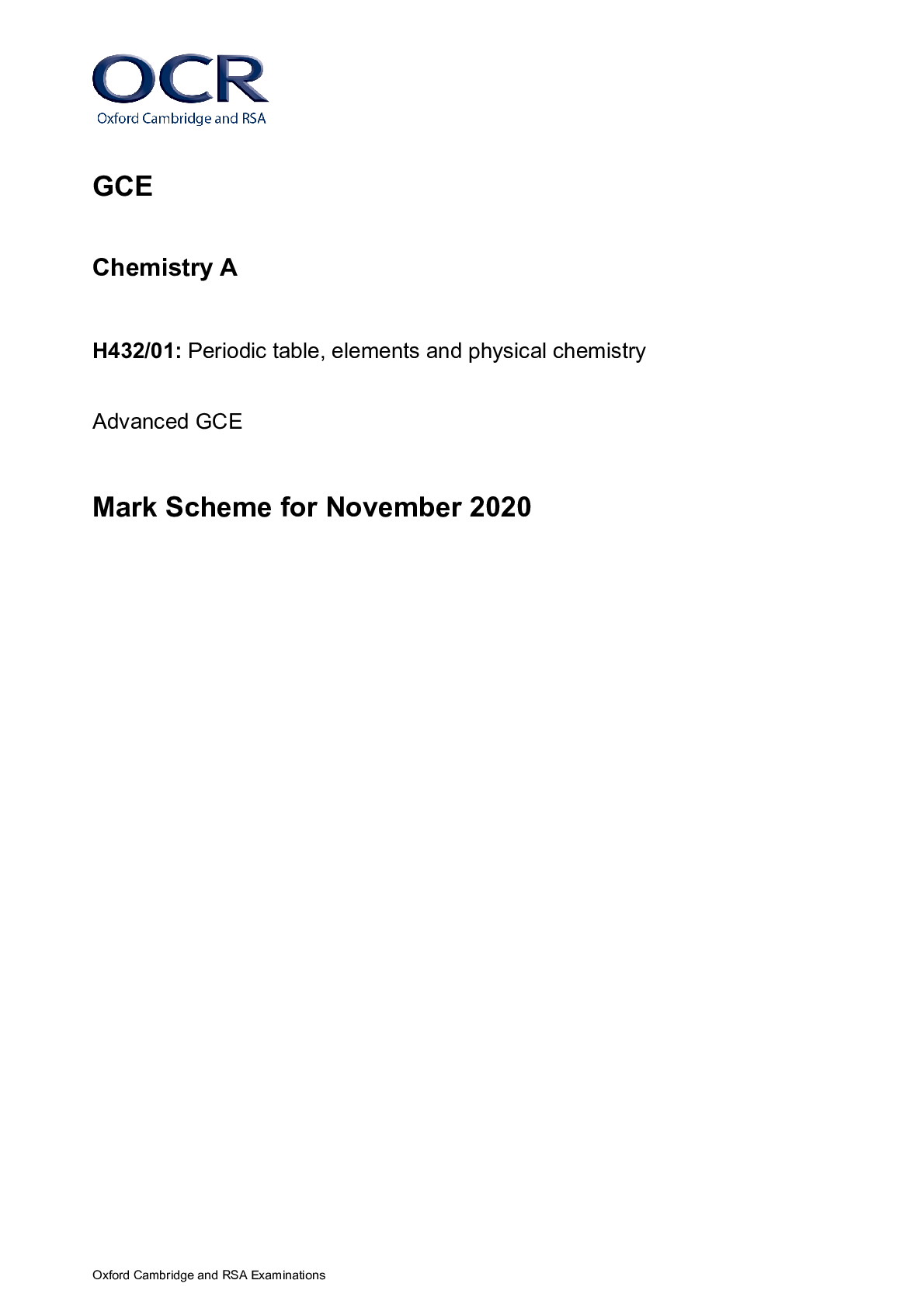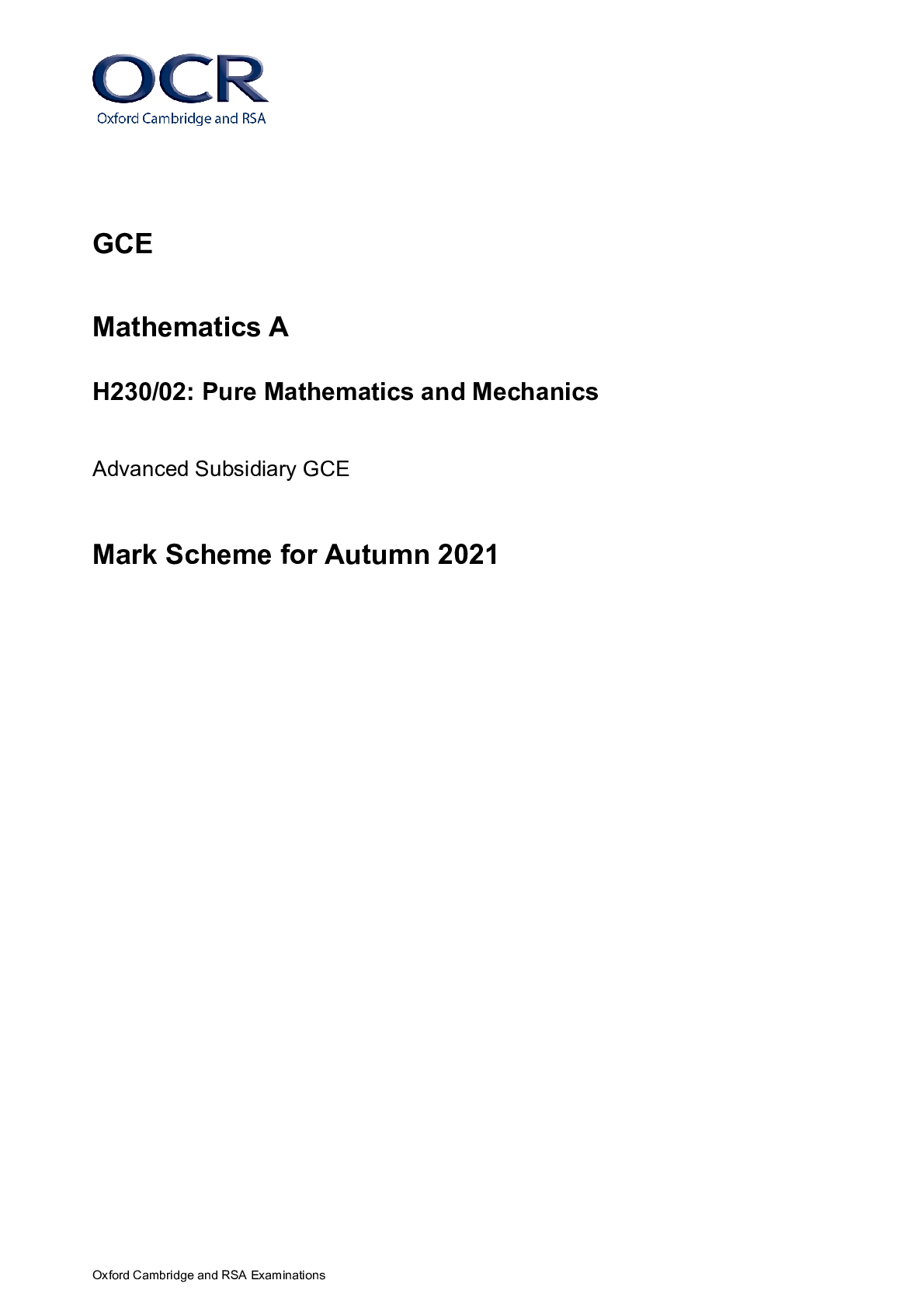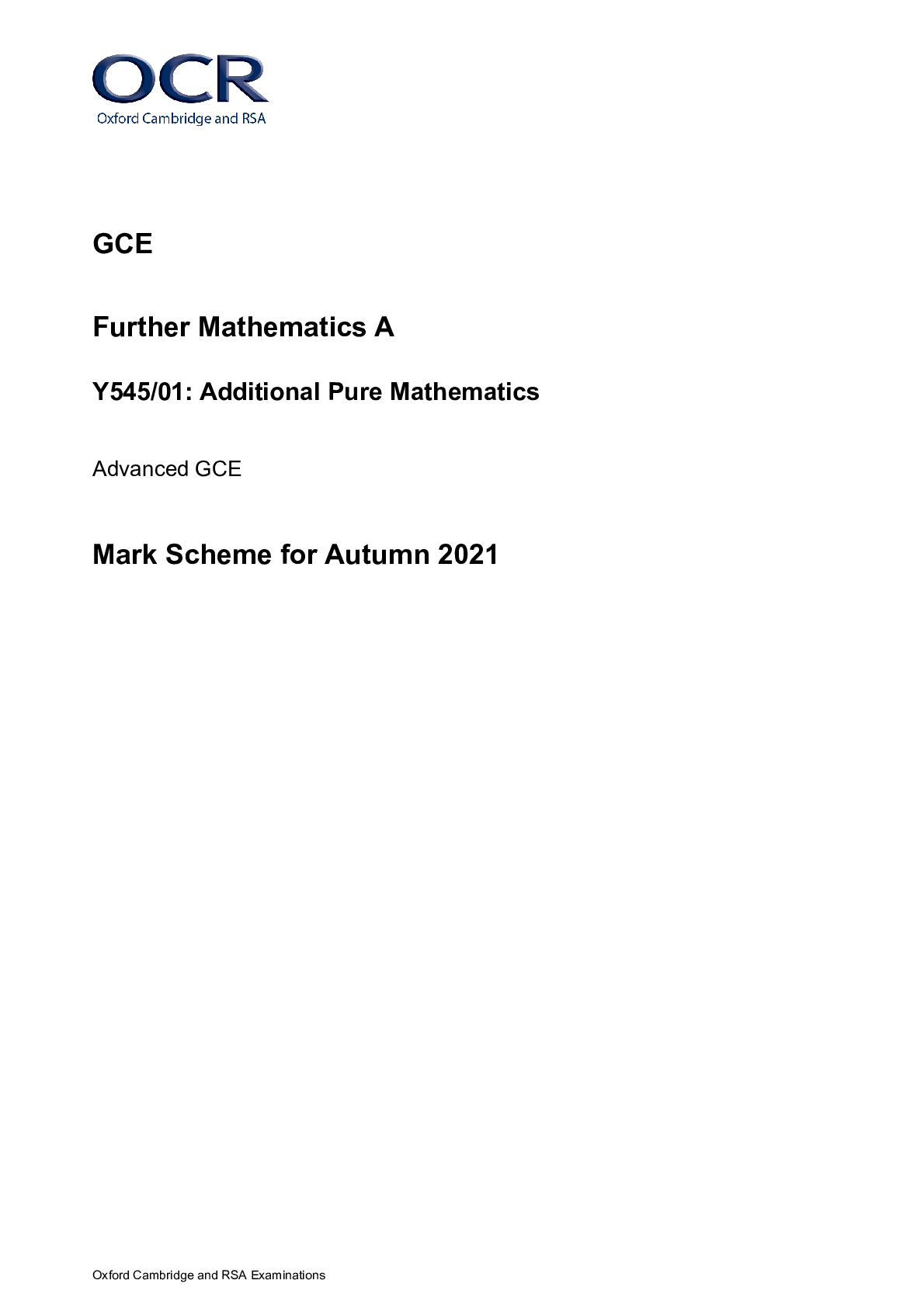History > AS Mark Scheme > GCE History A Y223/01: The Cold War in Europe 1941-1995 Advanced GCE Mark Scheme for November 2020 (All)
GCE History A Y223/01: The Cold War in Europe 1941-1995 Advanced GCE Mark Scheme for November 2020
Document Content and Description Below
Oxford Cambridge and RSA Examinations GCE History A Y223/01: The Cold War in Europe 1941-1995 Advanced GCE Mark Scheme for November 2020Oxford Cambridge and RSA Examinations OCR (Oxford Cambridg... e and RSA) is a leading UK awarding body, providing a wide range of qualifications to meet the needs of candidates of all ages and abilities. OCR qualifications include AS/A Levels, Diplomas, GCSEs, Cambridge Nationals, Cambridge Technicals, Functional Skills, Key Skills, Entry Level qualifications, NVQs and vocational qualifications in areas such as IT, business, languages, teaching/training, administration and secretarial skills. It is also responsible for developing new specifications to meet national requirements and the needs of students and teachers. OCR is a not-for-profit organisation; any surplus made is invested back into the establishment to help towards the development of qualifications and support, which keep pace with the changing needs of today’s society. This mark scheme is published as an aid to teachers and students, to indicate the requirements of the examination. It shows the basis on which marks were awarded by examiners. It does not indicate the details of the discussions which took place at an examiners’ meeting before marking commenced. All examiners are instructed that alternative correct answers and unexpected approaches in candidates’ scripts must be given marks that fairly reflect the relevant knowledge and skills demonstrated. Mark schemes should be read in conjunction with the published question papers and the report on the examination. © OCR 2020Y223/01 Mark Scheme November 2020 2 Annotations Annotation Meaning of annotation Blank Page Highlight Off-page comment Assertion Analysis Evaluation Explanation Factor Illustrates/Describes Irrelevant, a significant amount of material that does not answer the question Judgement Knowledge and understanding Provenance Simple comment Unclear ViewY223/01 Mark Scheme November 2020 3 Subject Specific Marking Instructions Question Answer/Indicative content Mark Guidance 1 (a) Which of the following was more significant in hindering the development of a Soviet Sphere of influence in Europe in the years between 1948 and 1955? i. Marshall Aid ii. The Berlin airlift? Explain your answer with reference to both (i) and (ii). • In dealing with Marshall Aid, answers might consider that this signalled an era of American interventionism to contain the spread of communism. • Answers might consider that Stalin prevented satellite states from accepting it, thus signalling that he saw it as a threat. • Answers might consider the importance of American financial aid in stabilising a western sphere of influence in Europe. • In dealing with the Berlin Airlift, answers might consider that it was a reaction to Stalin’s attempt to consolidate Soviet control of Berlin. • Answers might consider that the West was successful and retained control of the western zones of Berlin. • Answers might consider that its consequence was a stabilisation of the European situation into a permanently divided Germany and a unified NATO western zone. 10 • No set answer is expected • Judgement must be supported by relevant and accurate material. • Only credit material relevant to the extent to which each hindered the further development of a Soviet Sphere of Influence in Europe 1946-55. • Answers may deal with each factor in turn, then compare them to reach a judgement, or make take a continually comparative approach. Either approach is acceptable. • Knowledge must not be credited in isolation, it should only be credited where it is used as the basis for analysis and evaluation, in line with descriptions in the levels marks scheme.Y223/01 Mark Scheme November 2020 4 1 (b)* ‘Opposition to Soviet rule within the Eastern European satellite states in the period from 1956 to 1984 had little impact.’ How far do you agree? In arguing that they did have little impact, answers might consider: • The resistance movements of 1956 in Poland and Hungary, and in Czechoslovakia in 1968, did not succeed in reforming socialism. • The brutal response from the USSR and the continuation of Soviet rule. • The lack of involvement from the USA or reaction from the West. • Ongoing economic problems and a lack of economic reform in the Eastern Bloc. • The largely stable character of the Cold War in Europe in the period 1956 to 1984. In arguing that they did have an impact, answers might consider: • Their impact on people and infrastructure within the countries affected. • The partial success of protests in Poland in 1956. • The impact of the resistance in Poland and Hungary in 1956 on checking the process and extent of deStalinisation. • The impact on Khrushchev’s position of successfully dealing with the Hungarian crisis. • The significance of the Brezhnev Doctrine of 1968 in shaping the Cold War until 1984 onwards. • The impact of the Soviet reaction to the Prague Spring on slowing détente. • The importance of the development of opposition 20 • No set answer is expected. • At higher levels candidates will focus on ‘how far’, but at Level 4 may simply list impacts. • At Level 5 and above there will be judgement as to the relative extent and/or importance of impacts in different areas. • At higher levels candidates might establish criteria against which to judge success. • To be valid judgements, claims must be supported by relevant and accurate material. If not, they are assertions. • Knowledge must not be credited in isolation, it should only be credited where it is used as the basis for analysis and evaluation, in line with descriptions in the levels mark scheme.Y223/01 Mark Scheme November 2020 5 movements in Poland in the early 1980s on the ultimate collapse of Soviet control not only in Poland but in Eastern Europe more widely. 2 (a) Which of the following caused greater tensions and difficulties at the Potsdam Conference in 1945? (i) The future of Eastern Europe (ii) The future of Germany Explain your answer with reference to both (i) and (ii). • In dealing with future of Eastern Europe, answers might consider disagreement over the extent to which the Soviet Union should be able to establish a sphere of influence in Eastern Europe. • Answers might consider the issue of free elections. • Answers might consider how this problem had escalated at Potsdam due to the presence of Soviet troops in the East and the political developments that were already underway. • In dealing with the future of Germany, answers might consider the USSR’s concerns about its own security if Germany were allowed to recover and rearm. • Answers might consider how this differed to British and American views. • Answers might consider the issue of the division of Germany. 10 • No set answer is expected • Judgement must be supported by relevant and accurate material. • Only credit material relevant to causes of tension at the conferences. • Answers may deal with each factor in turn, then compare them to reach a judgement, or make take a continually comparative approach. Either approach is acceptable. • Knowledge must not be credited in isolation, it should only be credited where it is used as the basis for analysis and evaluation, in line with descriptions in the levels marks scheme. 2. (b)* ‘The formation of NATO was the most important factor contributing to the division of Europe into Eastern and Western blocs between 1945 and 1955.’ How far do you agree? In arguing that NATO was the main factor, answers might consider: 20 • No set answer is expected. • At higher levels candidates will focus on ‘how far’, but at Level 4 may simply list the factors. • At Level 5 and above there will be judgement as to the relative importance of reasons. • At higher levels candidates might establish criteria against which to judge.Y223/01 Mark Scheme November 2020 6 • It was a military alliance between the USA and Western European countries. • It guaranteed the defence of all countries in the event of aggression by the USSR. • The USSR responded with the Warsaw Pact, thus cementing the division of Europe into two military blocs. In arguing that NATO was not the main reason, answers might consider: • It occurred relatively late in this period, when arguably the division into two blocs was already fairly stable. • The development of Soviet control of Eastern Europe from the late stages of the Second World War onwards, and the attendant economic and political developments, the importance of which could be considered through the Iron Curtain speech. • The importance of the Truman Doctrine and Marshall Plan. • The importance of Cominform and Comecon in bringing Eastern Europe under unified Soviet control. • The importance of conflicts over, and developments in, Germany in bringing about division, for example through the merging of the Western Zones, the creation of the FRG and GDR and the importance of the Berlin Blockade and Airlift as a cause of the development of NATO. • The attitudes and actions of leaders including Stalin and Truman. • To be valid judgements, claims must be supported by relevant and accurate material. If not, they are assertions. • Knowledge must not be credited in isolation, it should only be credited where it is used as the basis for analysis and evaluation, in line with descriptions in the levels mark scheme.OCR (Oxford Cambridge and RSA Examinations) The Triangle Building Shaftesbury Road Cambridge CB2 8EA [Show More]
Last updated: 1 year ago
Preview 1 out of 8 pages
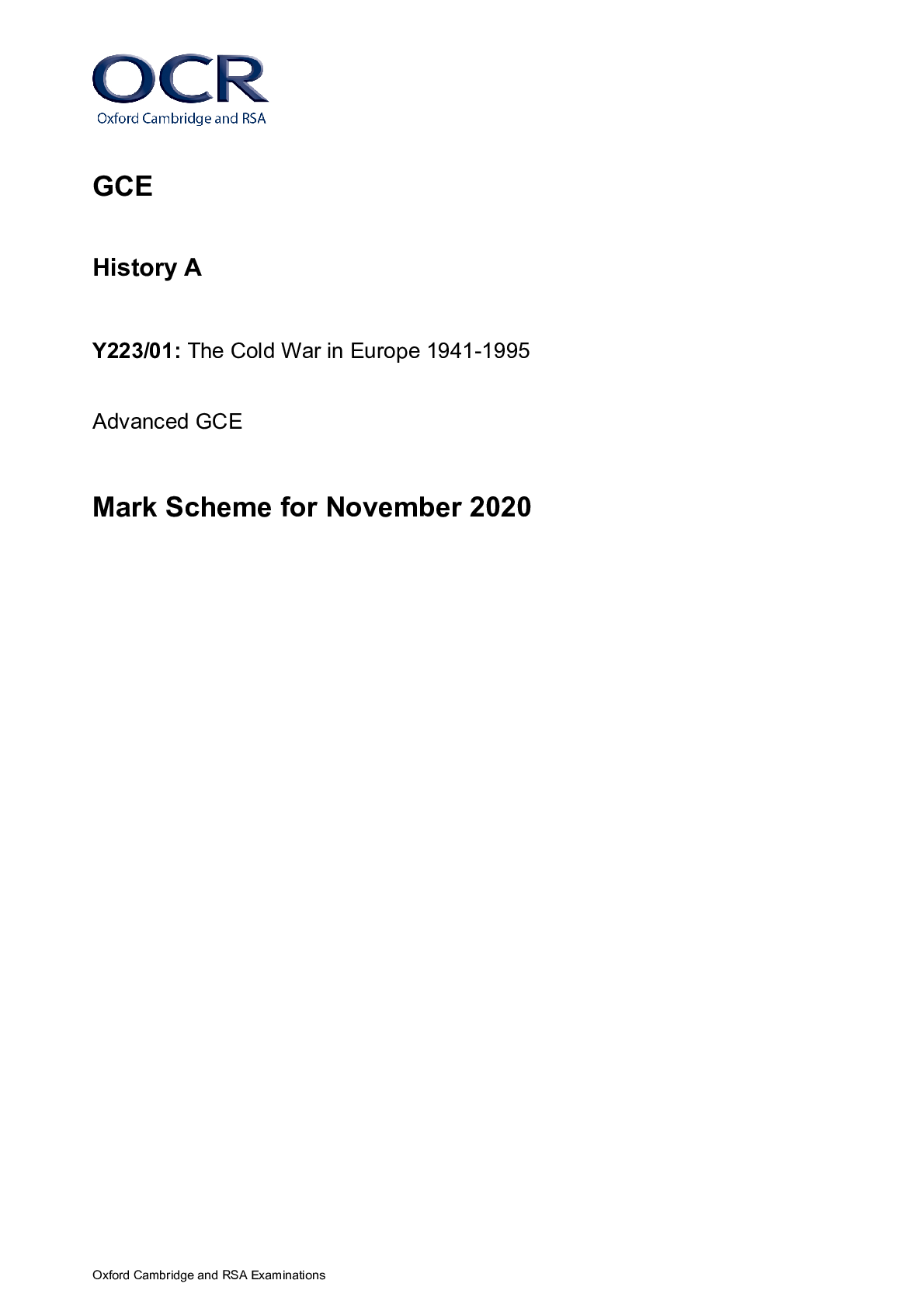
Reviews( 0 )
Document information
Connected school, study & course
About the document
Uploaded On
Oct 10, 2022
Number of pages
8
Written in
Additional information
This document has been written for:
Uploaded
Oct 10, 2022
Downloads
0
Views
33

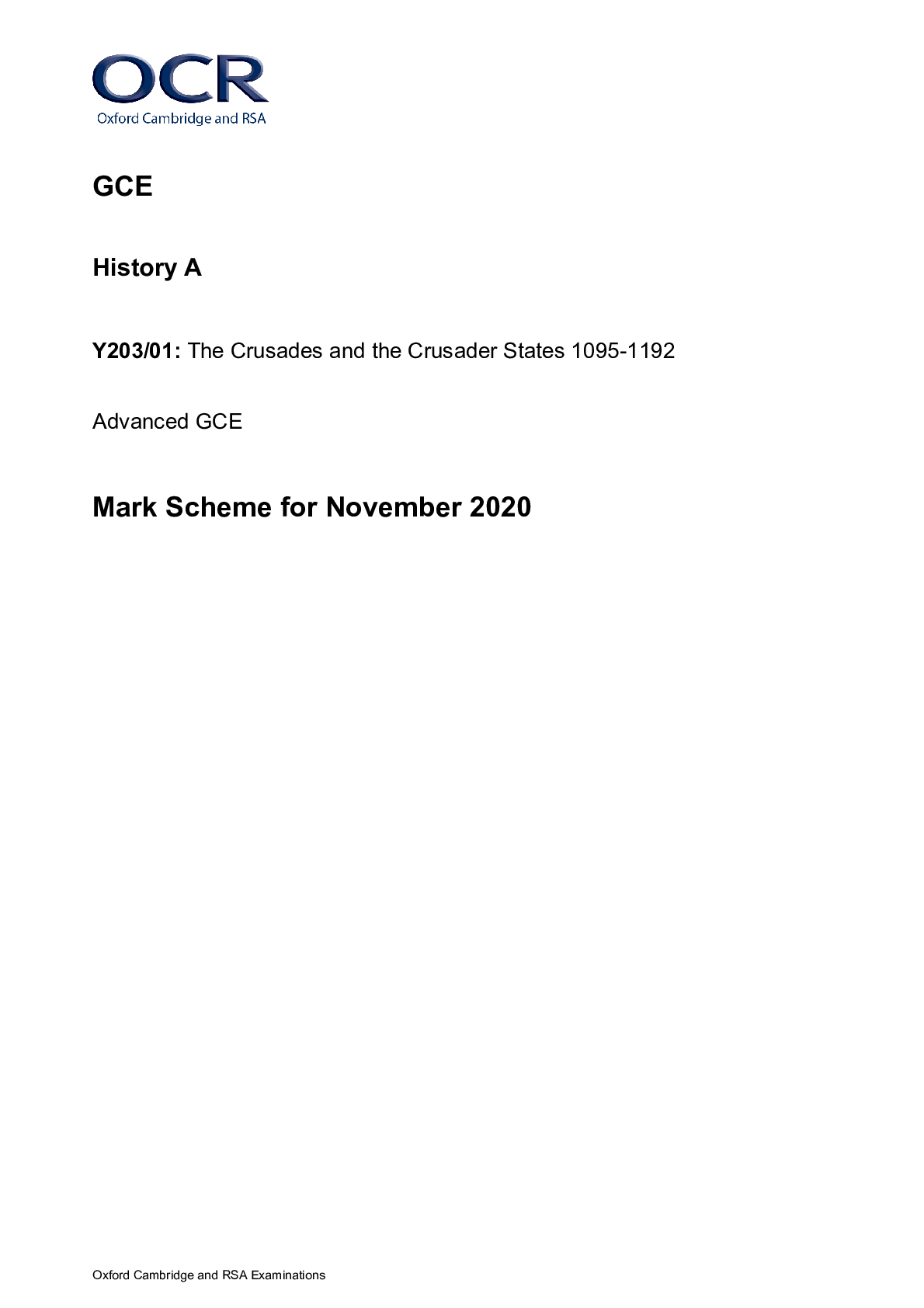


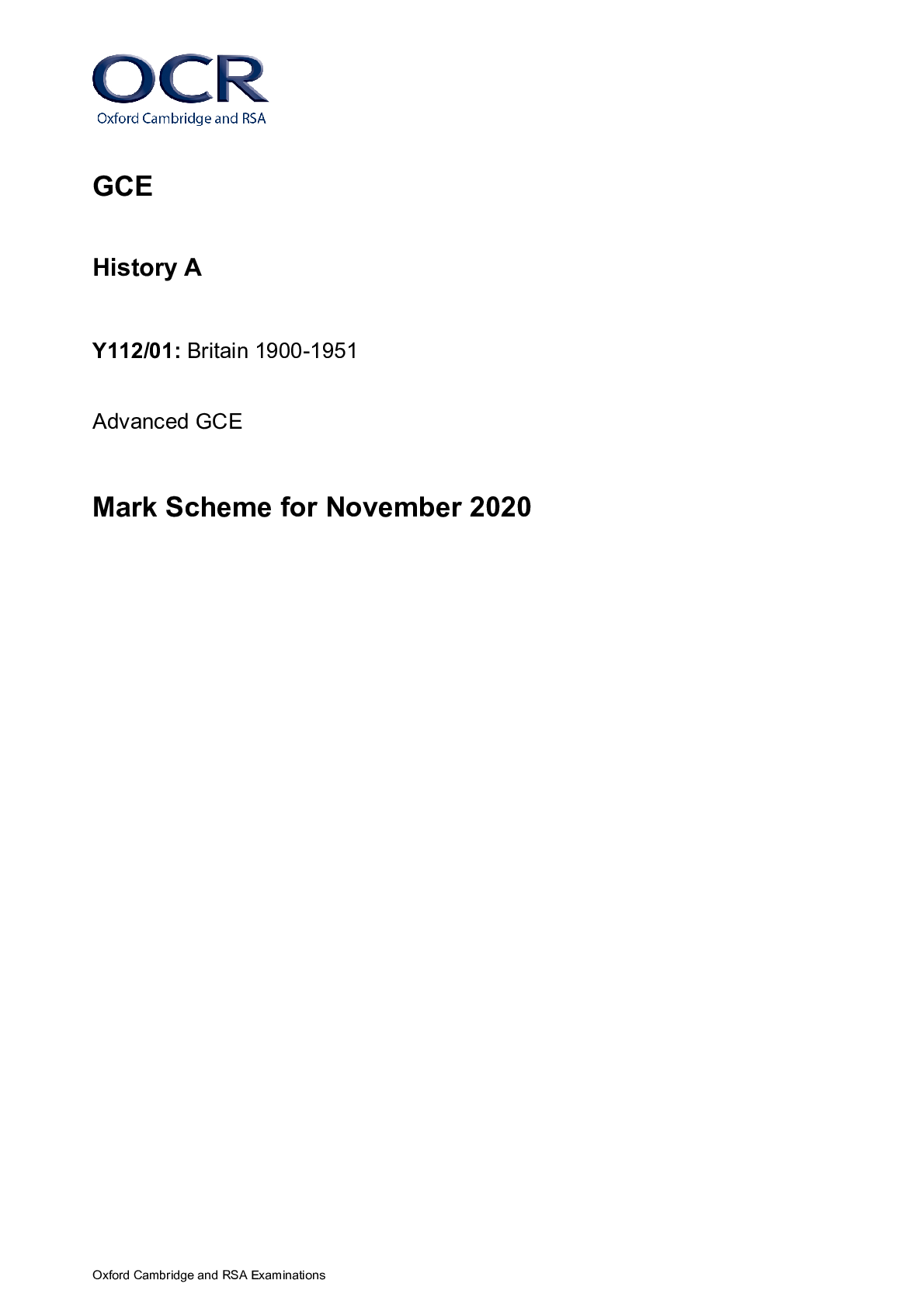
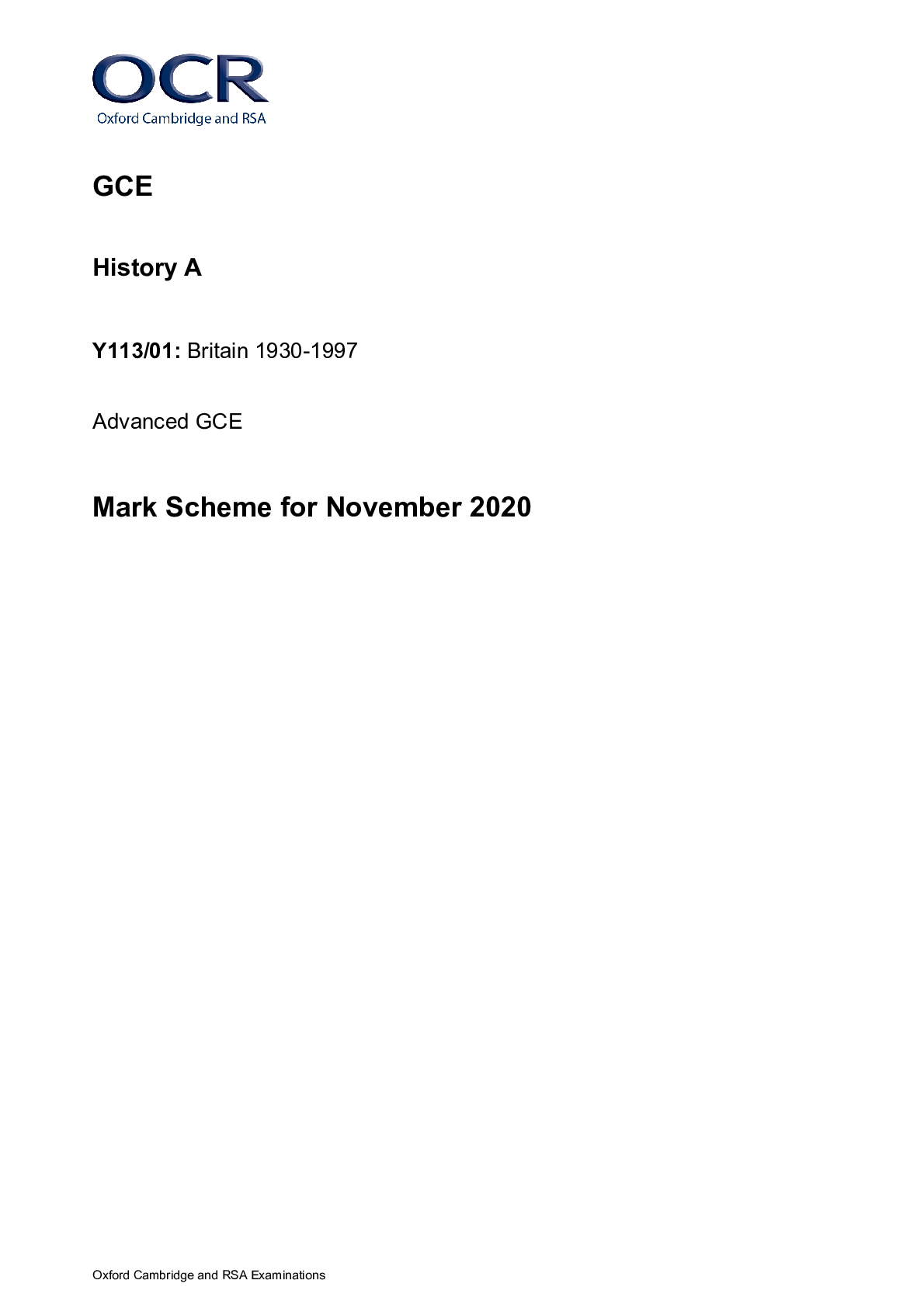
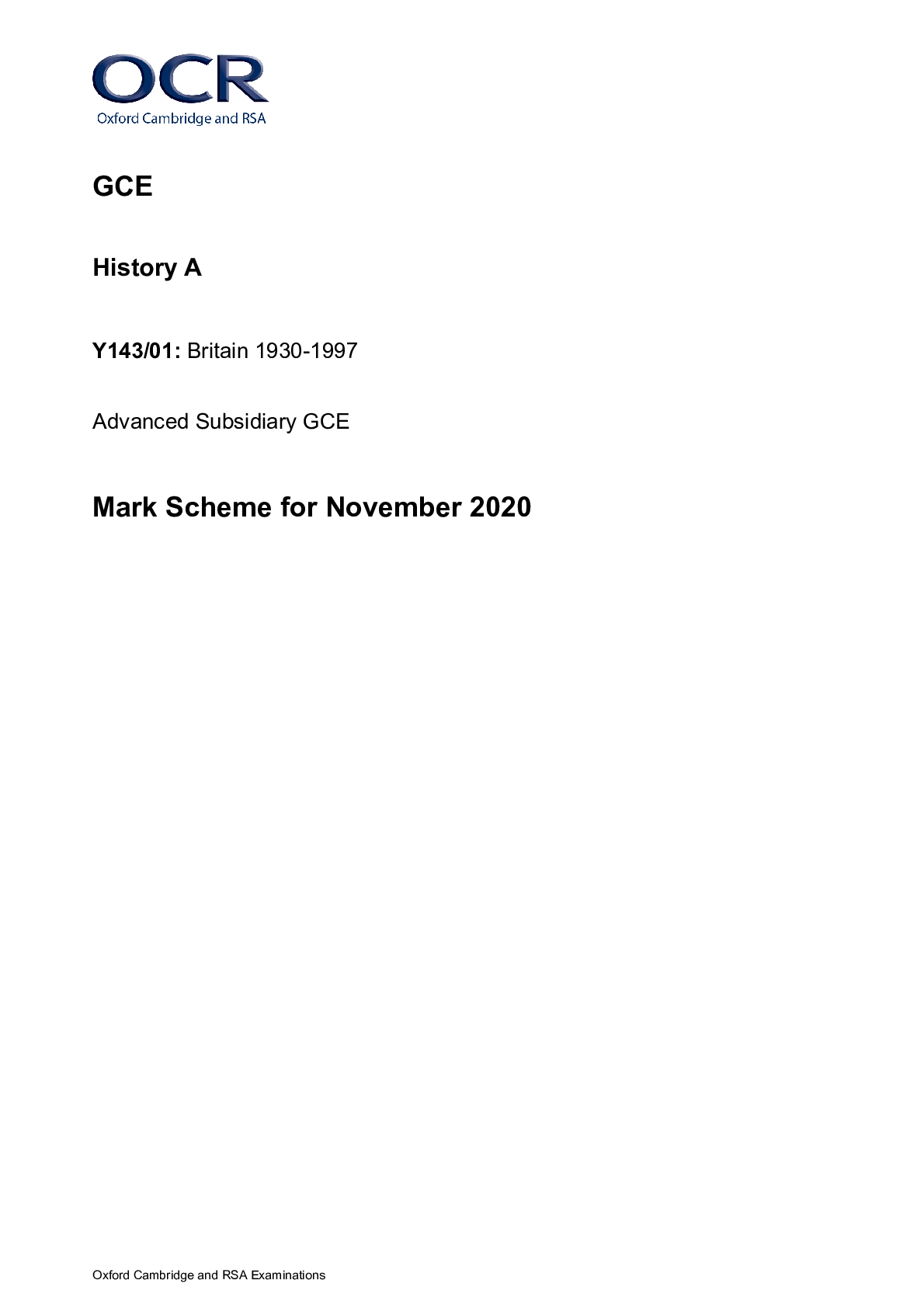
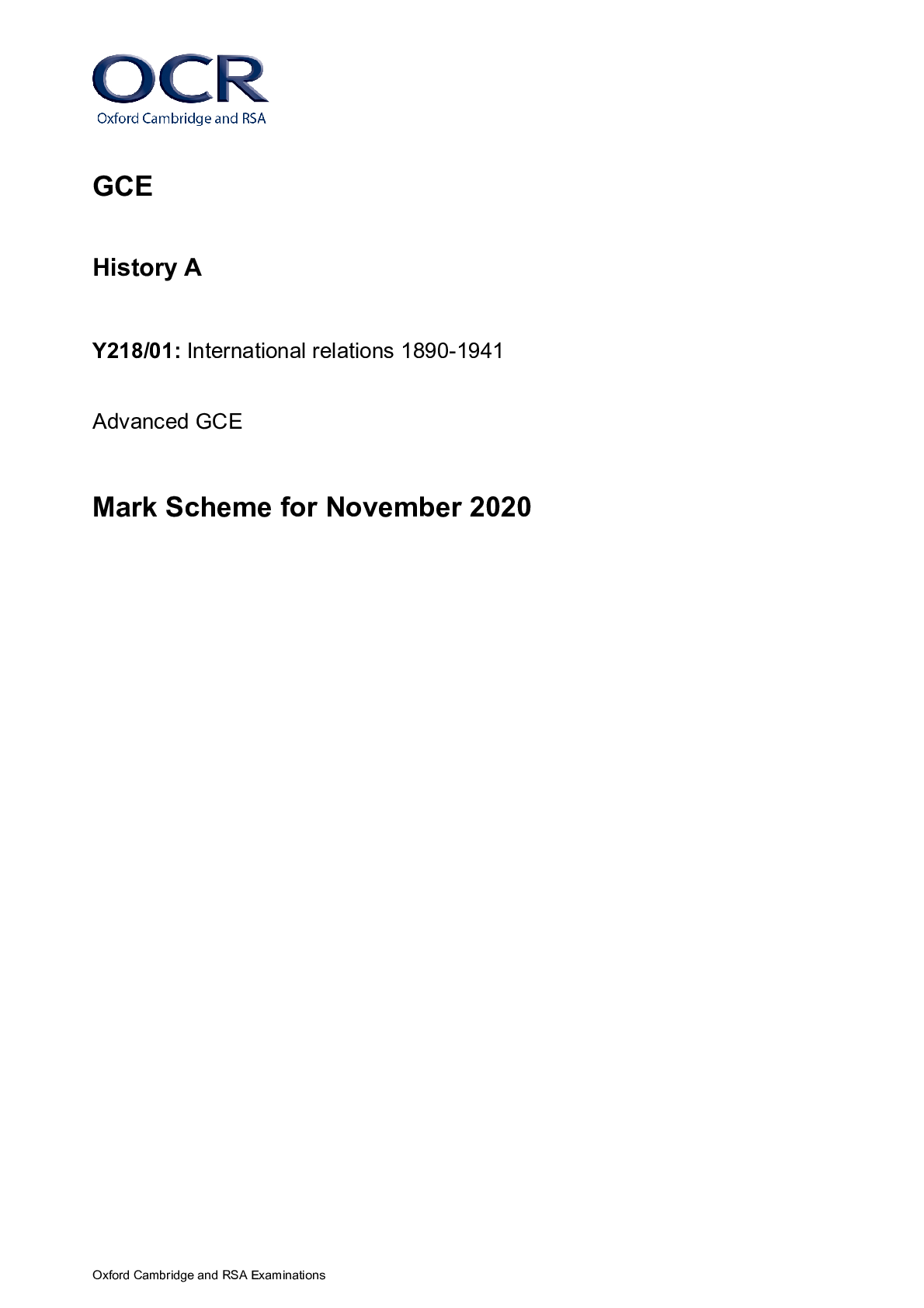
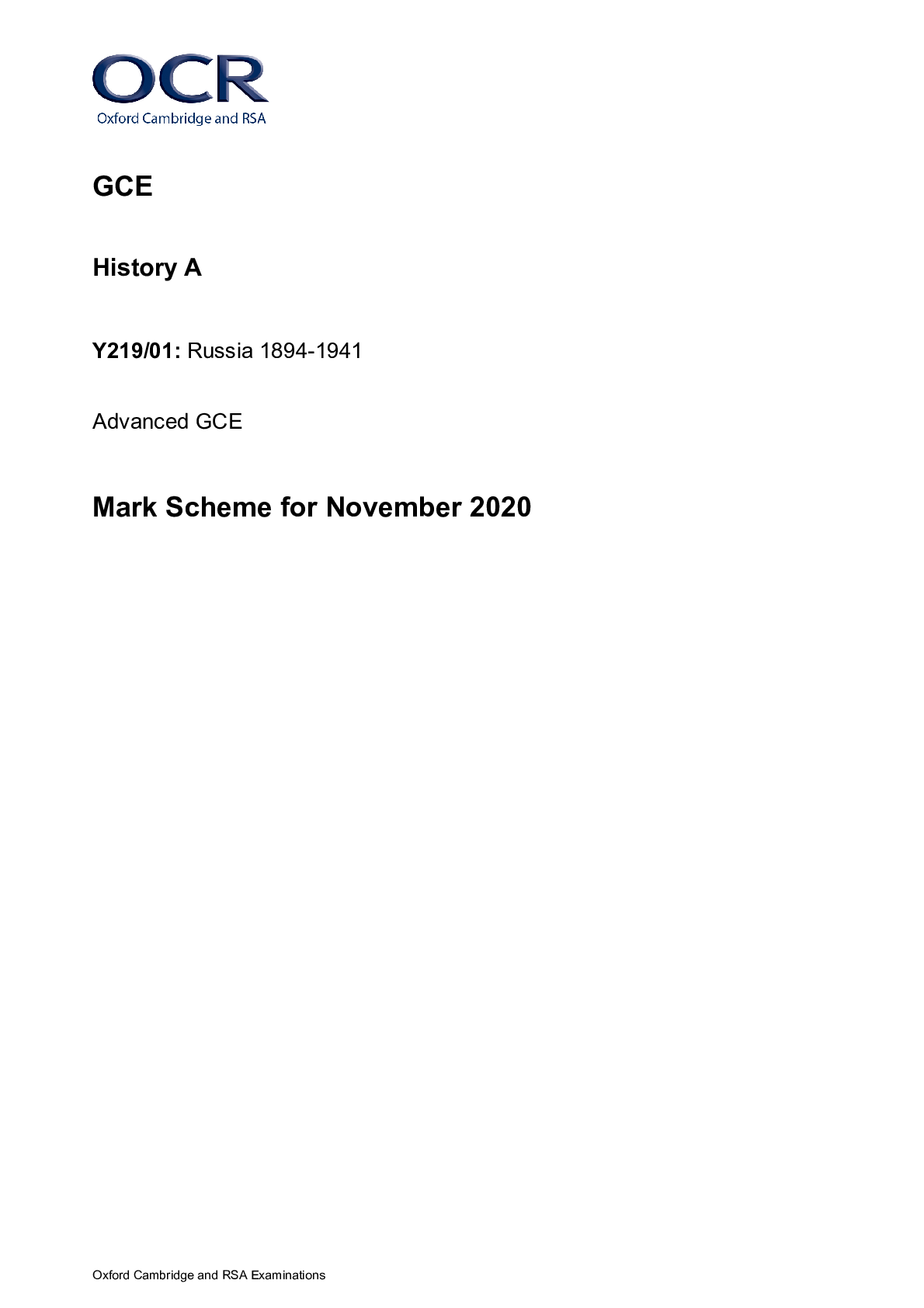
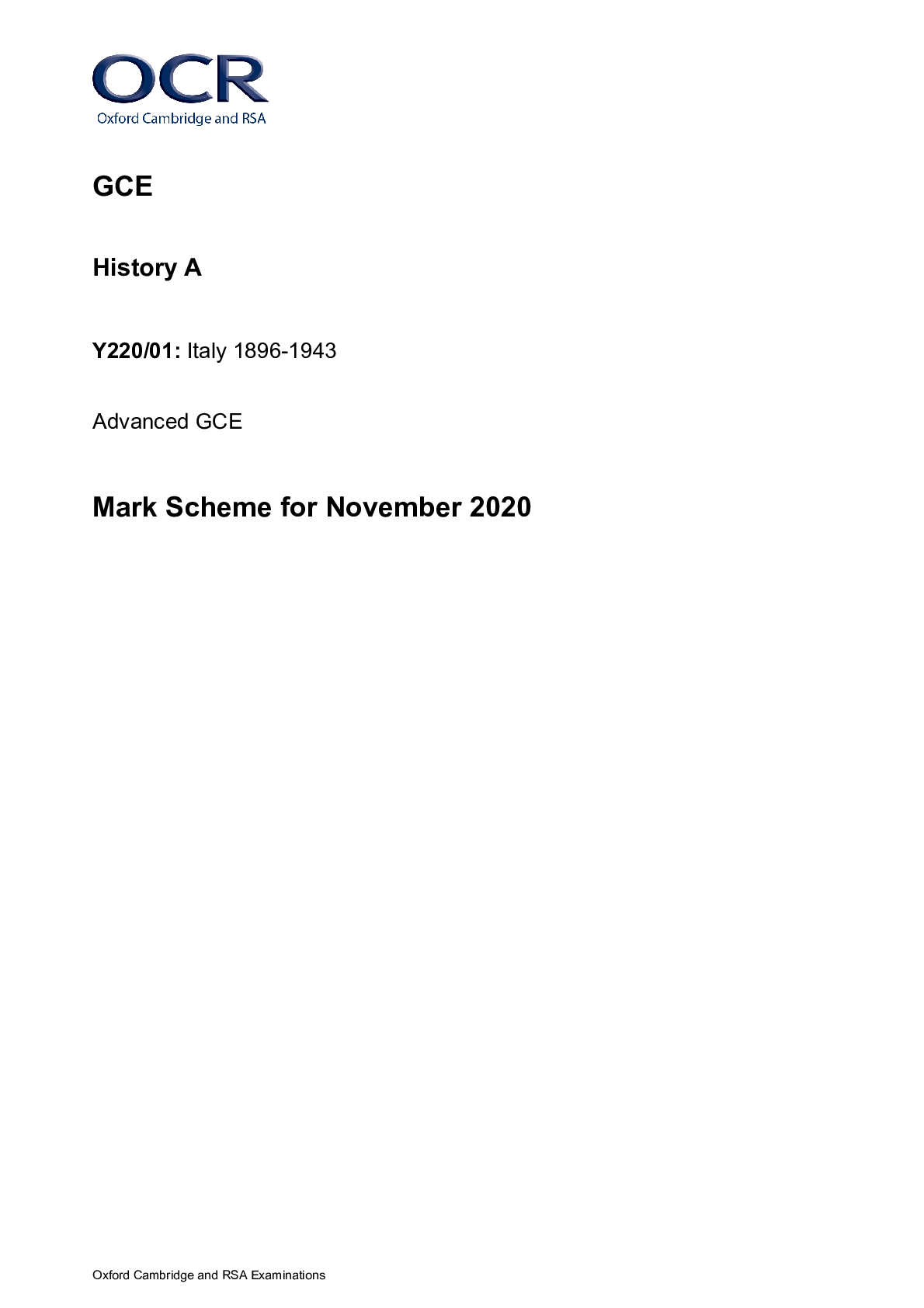
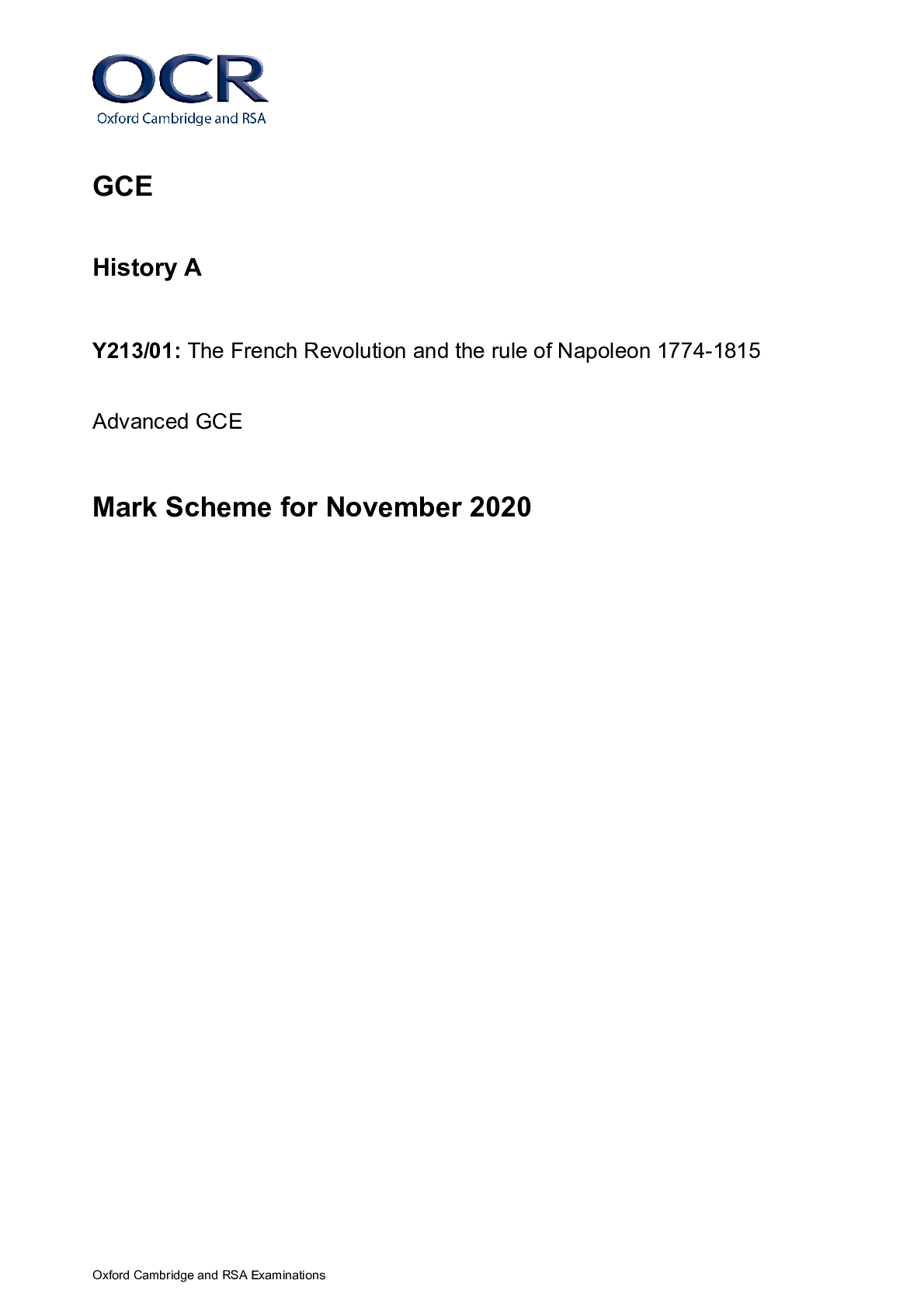
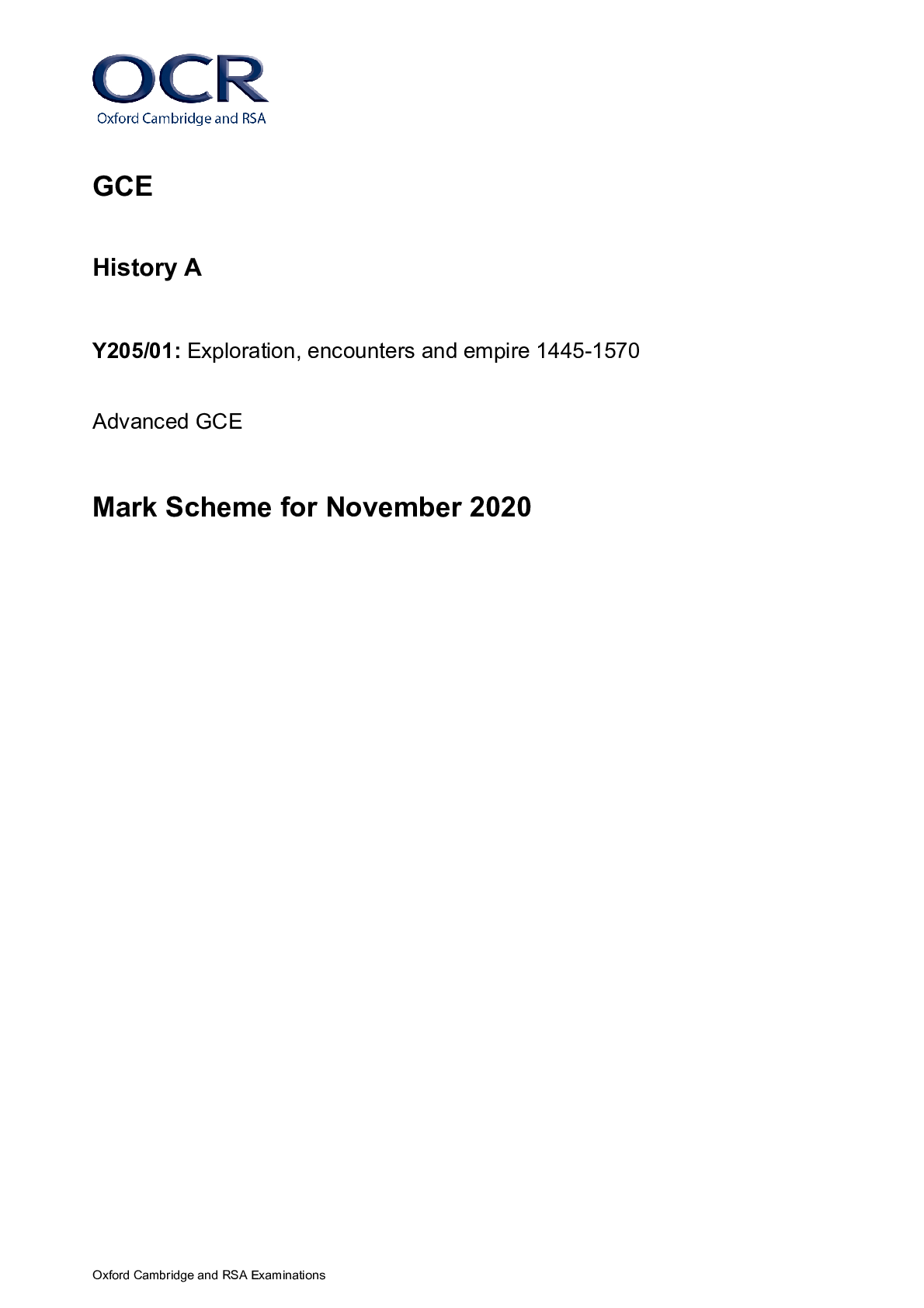
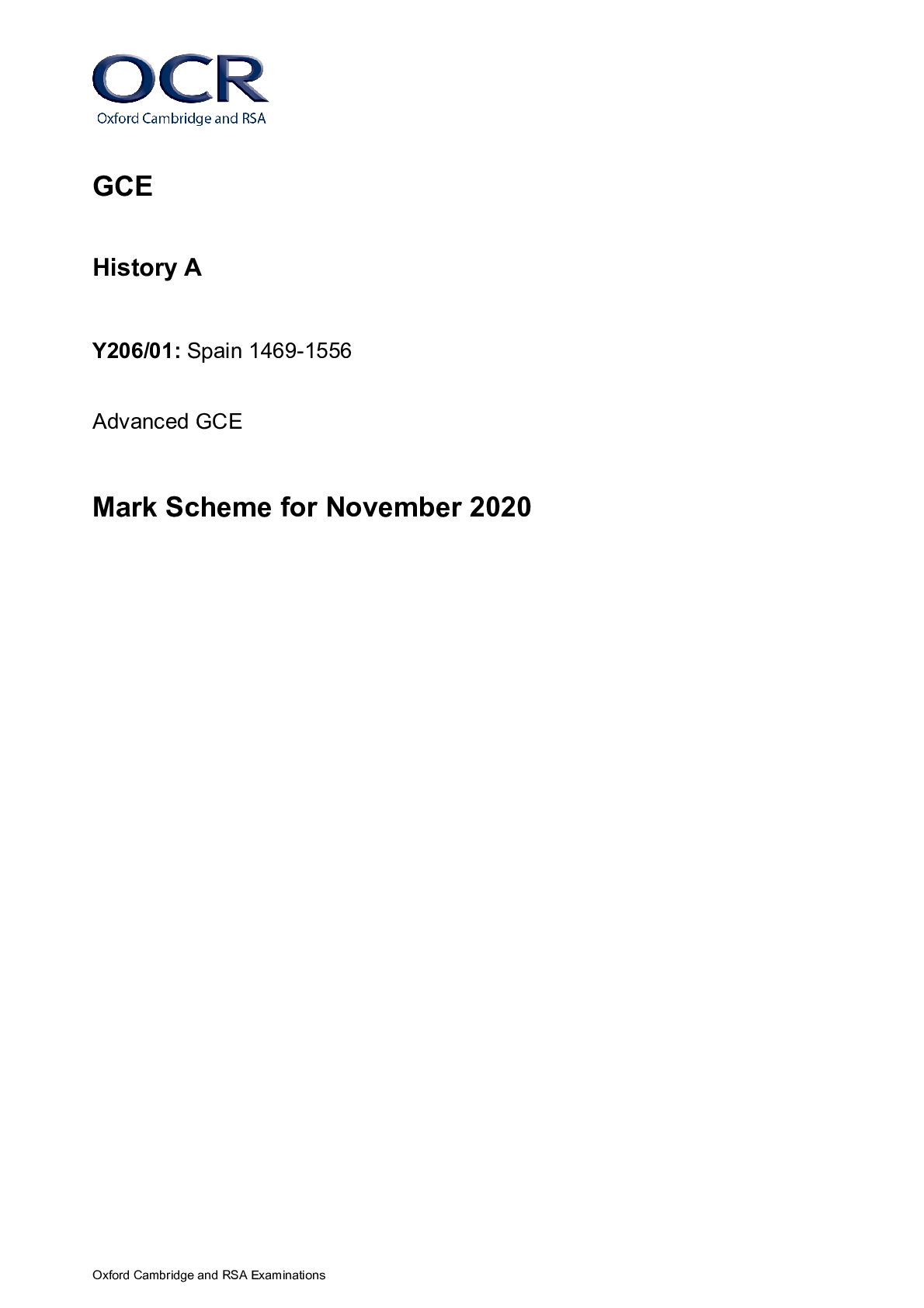
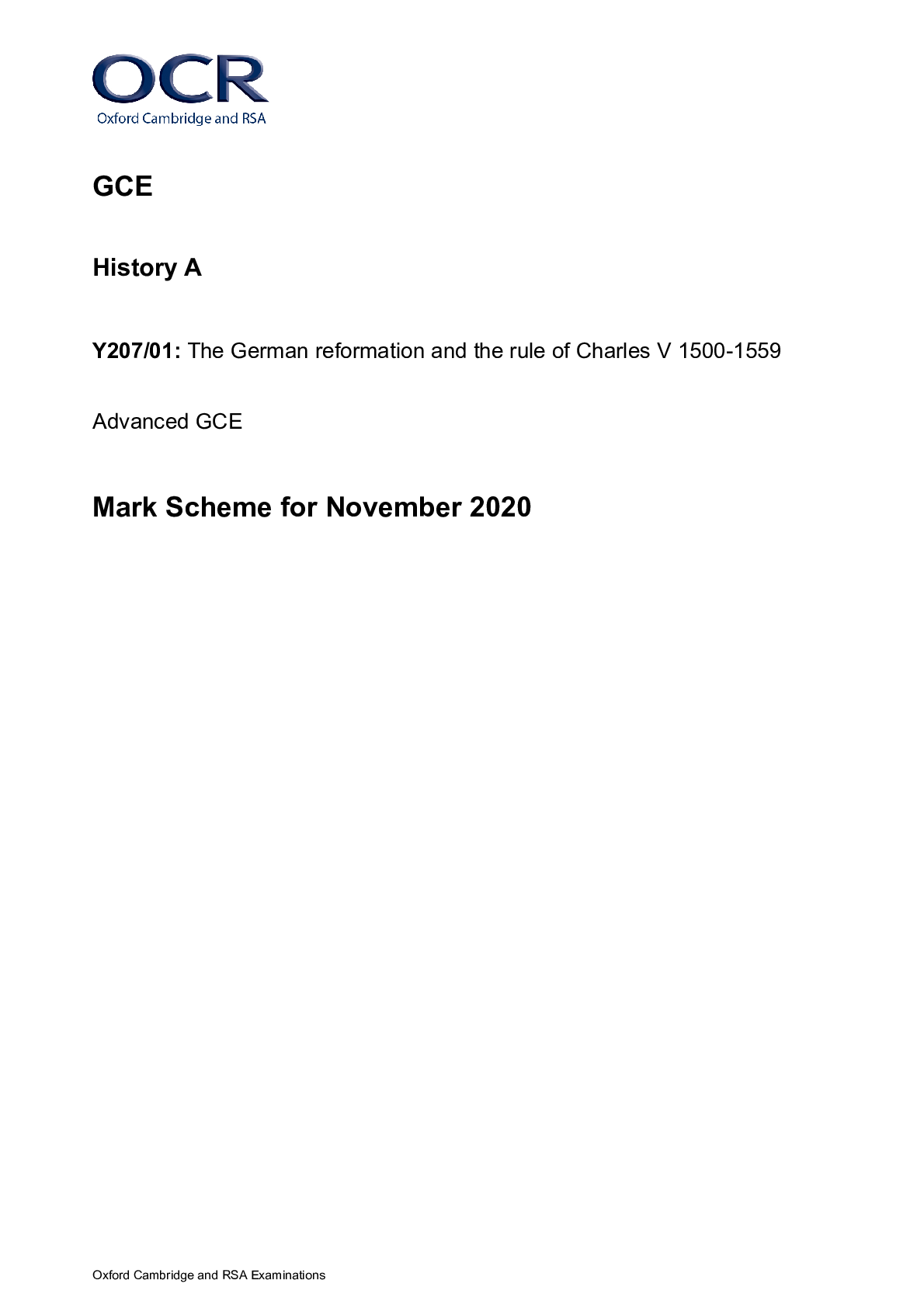
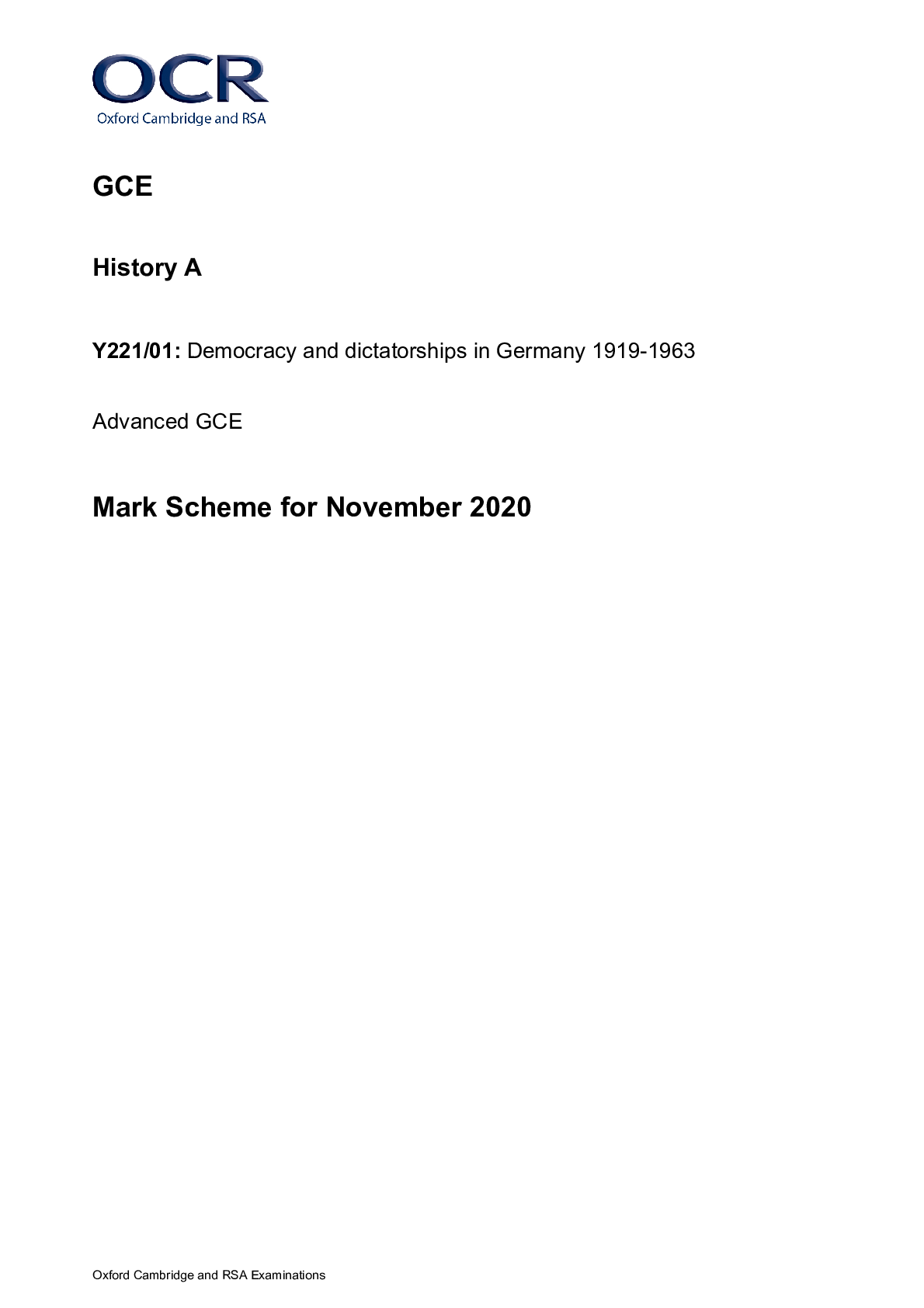
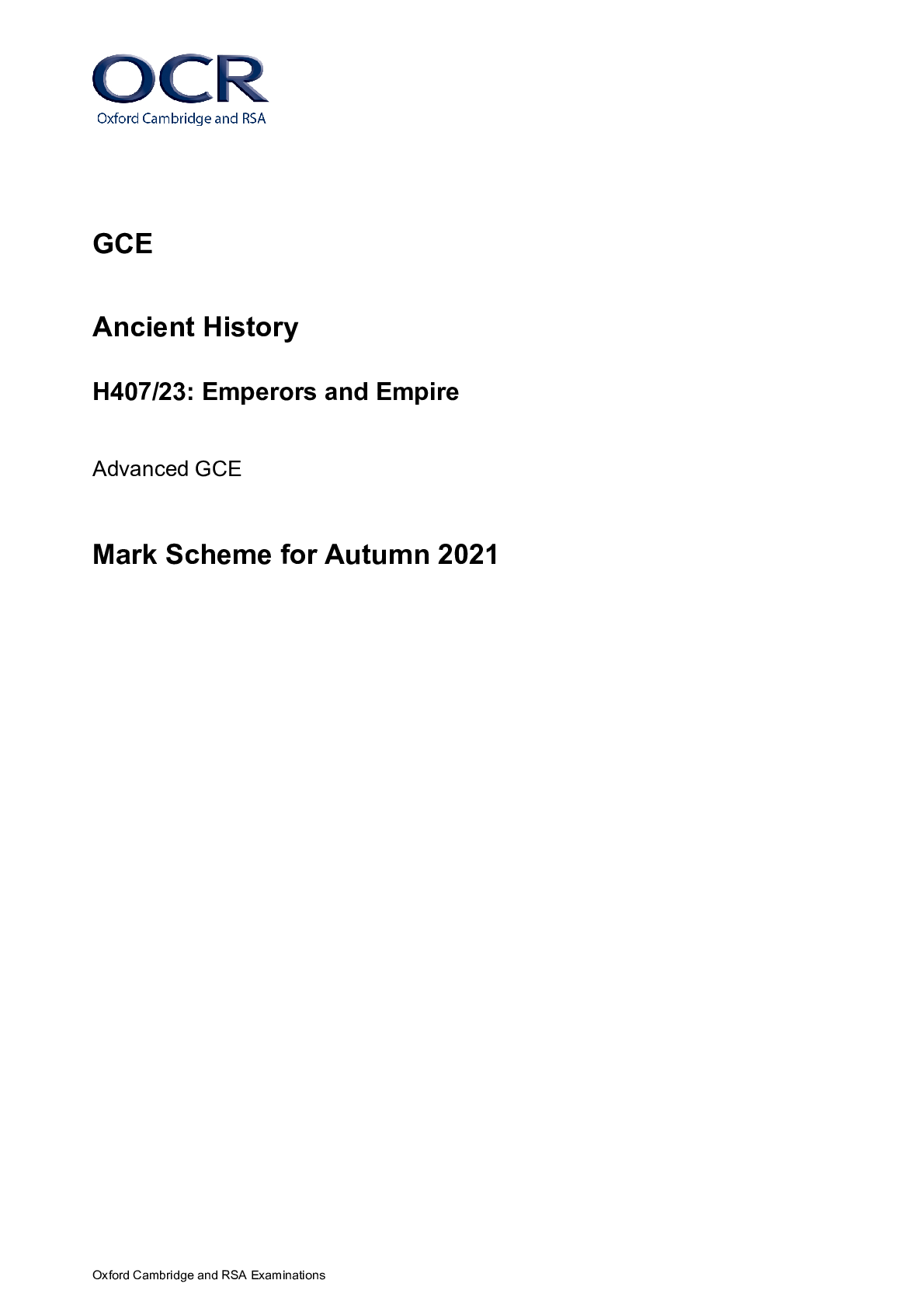
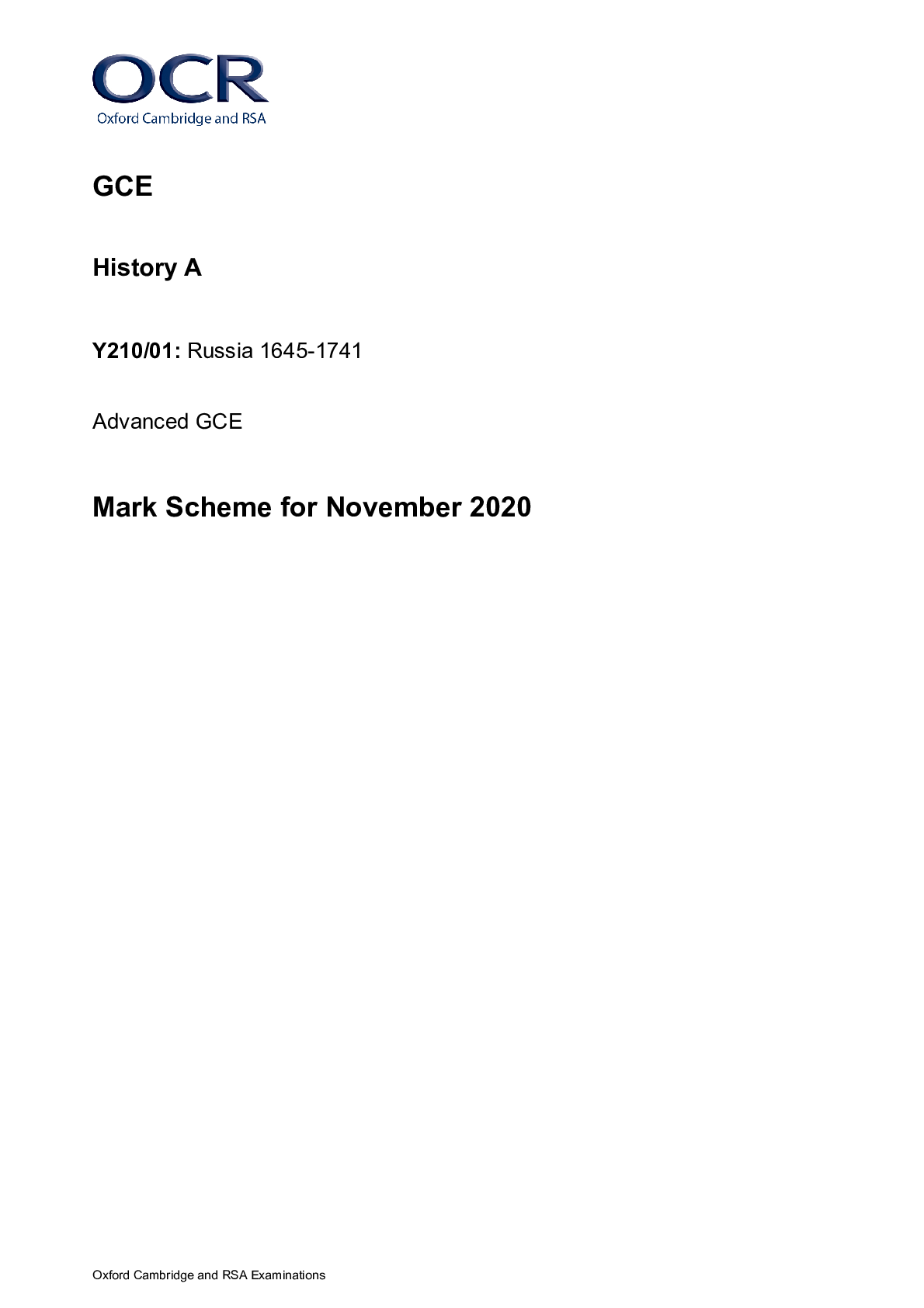
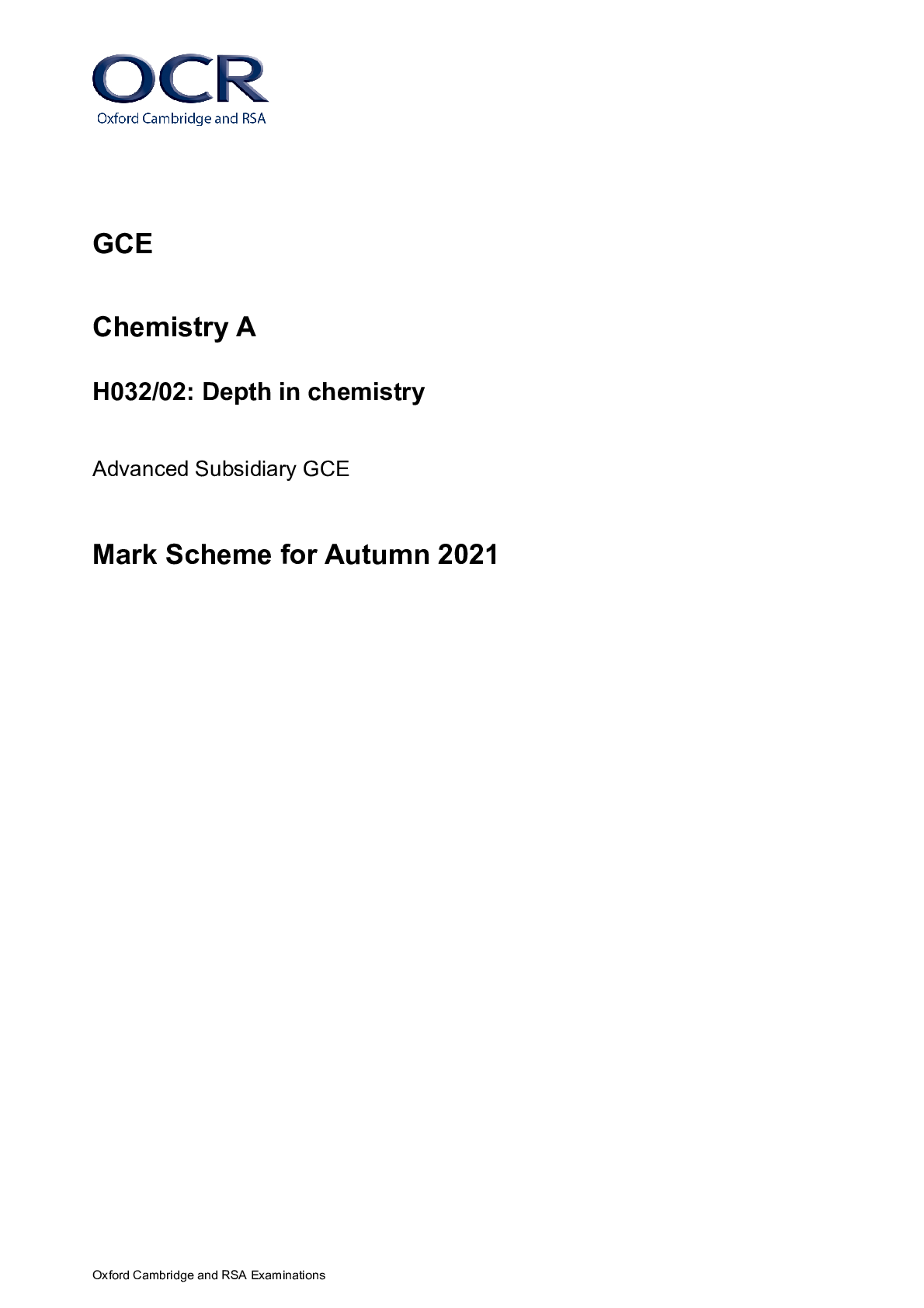
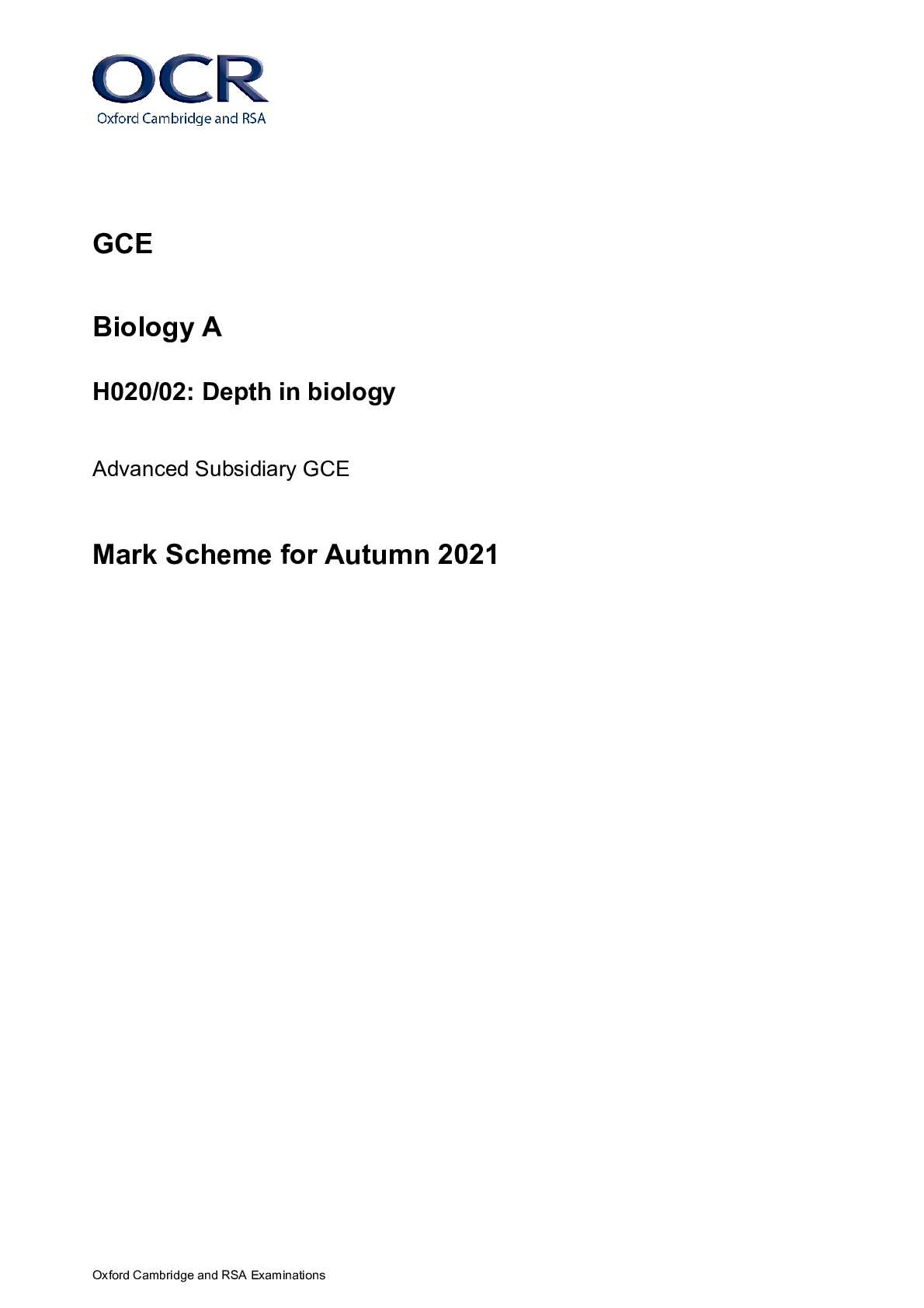
.png)

